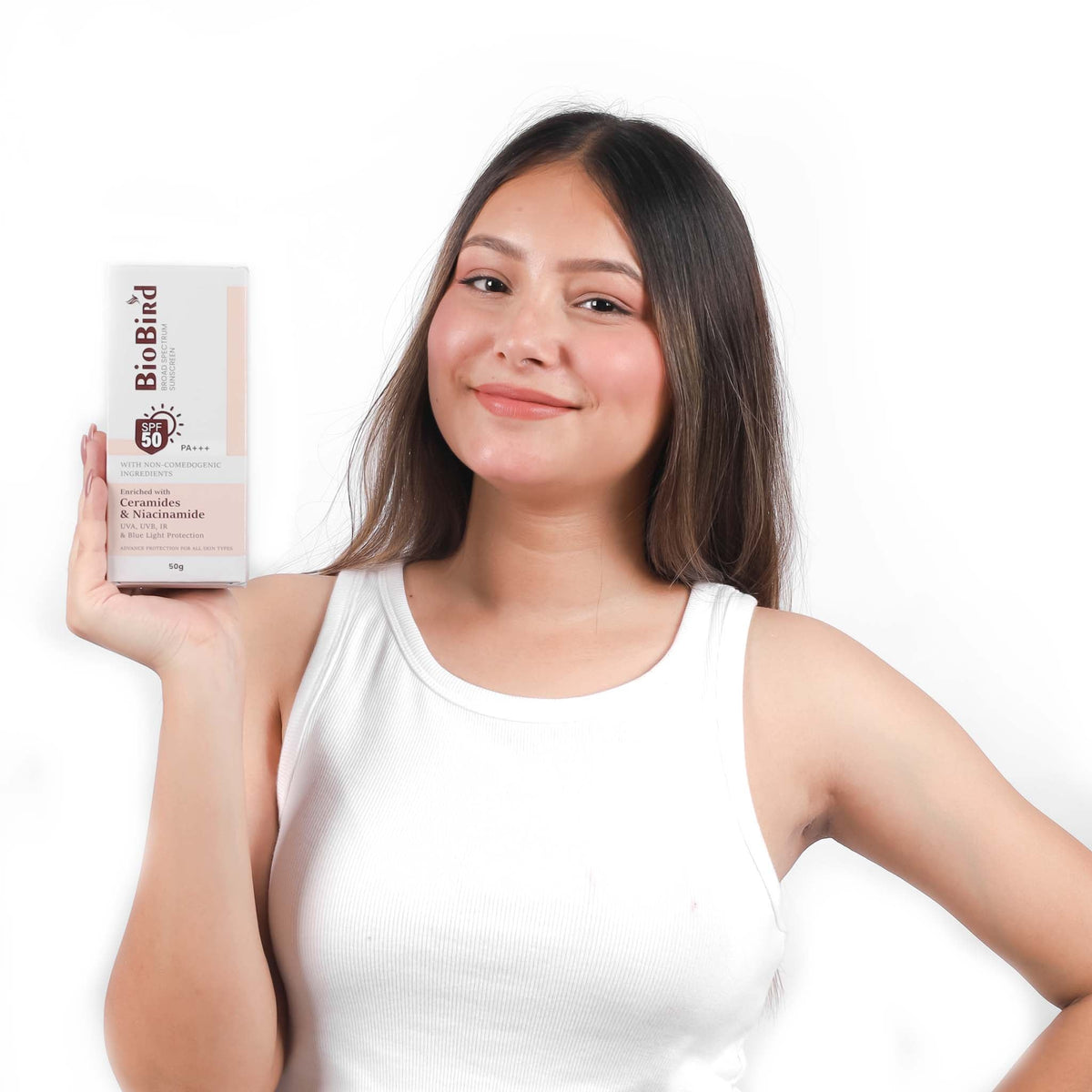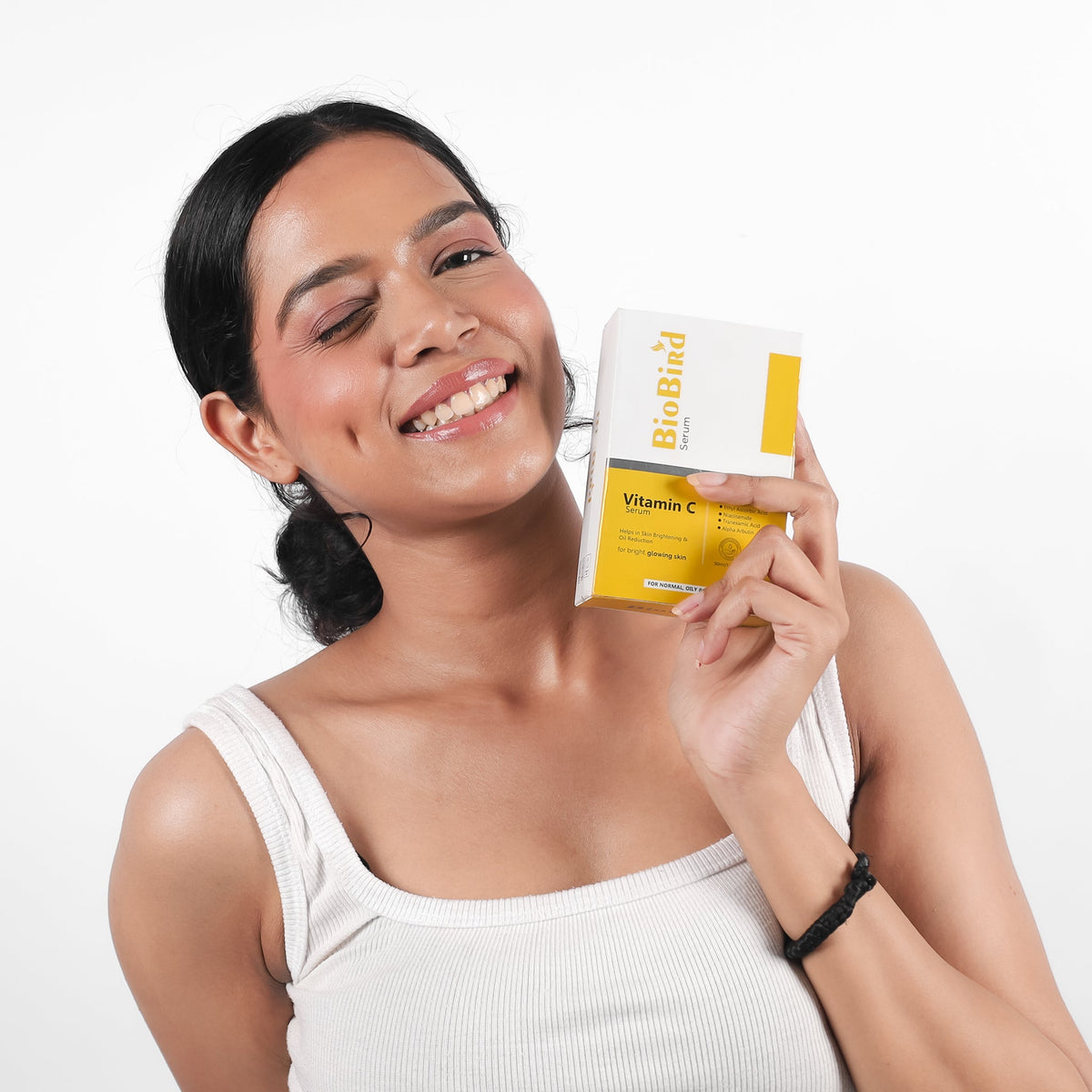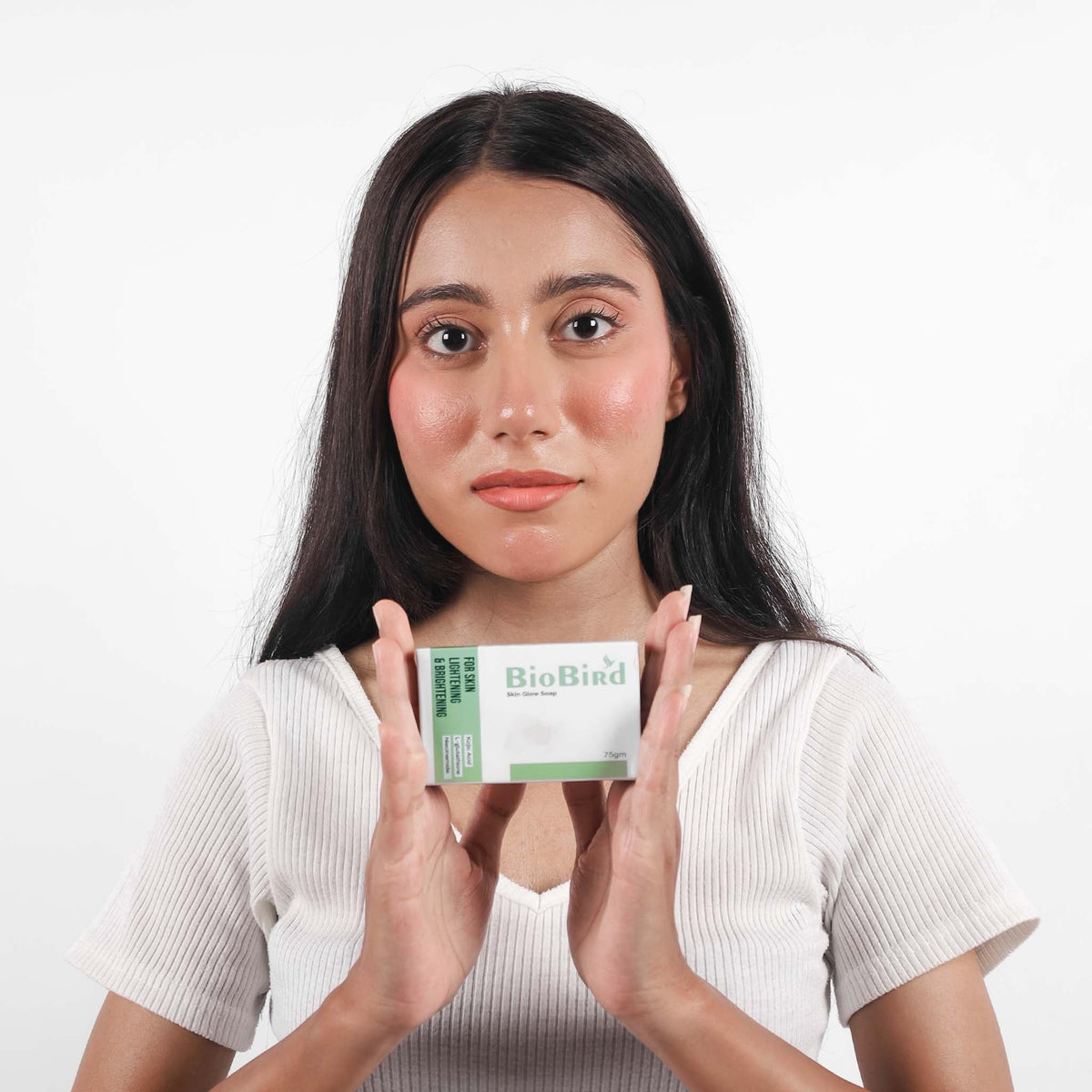Sun may feel warm and comforting on your skin, but its effects run deeper than you think. Prolonged exposure to UV rays doesn’t just cause tanning—it silently accelerates aging, and triggers stubborn dark spots, making your skin look dull and damaged over time. It is one of the biggest culprits behind premature aging, hyperpigmentation, and skin damage.
While sunscreen is your first line of defense, it can’t block all the harmful effects of sun exposure. Free radicals, pollution, and environmental stressors continue to take a toll on your skin, leading to premature wrinkles and uneven tone. But don’t worry—this is where Vitamin C steps in as your skin’s ultimate shield. Packed with powerful antioxidant properties, it helps repair sun damage, restore radiance, and boost your skin’s natural defense, making it an essential addition to any skincare routine.
Ready to unlock its full potential? Dive into this blog to explore how Vitamin C can transform your skincare game, the best formulations to choose, and expert recommendations to keep your skin glowing, youthful, and protected.
Article Highlights
- Impact of UV Exposure on Skin
- How does Vitamin C protect skin?
- How to Include Vitamin C in Your Skincare Routine?
- Treating Skin Damage with Vitamin C- What Cosmetologist Says?
- The Best Vitamin C Serum to Protect Your Skin
- Conclusion
- Frequently asked questions (FAQs)
Impact of UV Exposure on Skin
Our skin, being the outermost layer of the body, is constantly exposed to environmental factors, particularly the sun’s UV radiation. UV exposure is a leading cause of various skin concerns, including sunburn, premature aging (wrinkles, thinning skin, and dark spots), and even skin cancer.

There are three types of UV rays:
- UVB rays affect the outer layer of the skin (epidermis) and are the main cause of sunburn and surface-level damage.
- UVA rays penetrate deeper into the skin (dermis), accelerating aging, breaking down collagen, and reducing skin firmness.
- UVC rays are mostly absorbed by the ozone layer and don’t reach the skin.
The extent of sun damage depends on the duration and intensity of UV exposure, particularly UVA and UVB rays, along with visible light and infrared radiation. UV radiation triggers the formation of free radicals (reactive oxygen species or ROS) in the skin, leading to oxidative stress and cellular damage. This process weakens collagen and elastin, essential proteins that keep the skin firm and hydrated. As a result, the skin becomes dry, less elastic, and more prone to wrinkles, leading to premature aging.
Frequent sun exposure also triggers an increase in melanin production, causing skin darkening**.** This happens when pigment-producing cells (melanocytes) become overactive and make more melanin, leading to dark spots, uneven skin tone, and discoloration. Long-term exposure can further disrupt the balance of these cells, making pigmentation issues harder to reverse.
How Does Vitamin C Protect Skin?
As mentioned above, sun exposure is inevitable and can cause serious skin problems. So, is there a way to shield the skin from sun damage? Absolutely! The answer lies in antioxidants that protect against free radicals produced during UV exposure. One such powerful antioxidant is Vitamin C.

Vitamin C is a naturally occurring, potent, water-soluble molecule that offers a range of protective and restorative benefits for the skin. Here are the vital benefits of Vitamin C for protecting skin damage:
- Neutralizes Free Radicals: Vitamin C fights harmful reactive oxygen species (ROS) produced by UV exposure, preventing DNA damage, collagen breakdown, and premature aging.
- Enhances UV Protection: While it’s not a sunscreen, Vitamin C boosts sun protection by reducing free radical damage. ****Studies have shown that 10% Vitamin C can reduce UVB-induced redness by 52% and lower sunburn cell formation by 40-60%.
- Promotes Collagen Production: Vitamin C plays a vital role in collagen synthesis, helping to keep skin firm and elastic. It also stabilizes collagen molecules, reducing the appearance of fine lines and wrinkles.
- Fades Hyperpigmentation & Brightens Skin: Vitamin C inhibits melanin production by blocking the enzyme tyrosinase, effectively reducing dark spots, brightening the complexion, and evening out skin tone.
- Reduces Inflammation: It soothes irritation and inflammation, making it beneficial for acne-prone skin, rosacea, and post-inflammatory hyperpigmentation.
How to Include Vitamin C in Your Skincare Routine?
Now that you have studied the multiple benefits of Vitamin C for skin, it is important to learn how you can reap the benefits of Vitamin C. Adding Vitamin C to your daily regimen can protect, brighten, and rejuvenate your skin, but using it correctly is key to maximizing its benefits.

Here’s how you can seamlessly incorporate this powerhouse antioxidant into your regimen:
1) Choose the right product
Vitamin C is available in multiple formulations, including oral supplements, topical serums, and creams. While oral Vitamin C benefits skin health, topical Vitamin C is the most effective for targeting skin concerns directly. Research studies indicate that topical application of vitamin C delivers 20-40 times more Vitamin C to the skin than oral supplementation. When applied to the skin, it provides antioxidant protection, far more efficiently than oral supplements. Therefore, Serums are the best choice because they deliver a higher concentration of Vitamin C directly into the skin, ensuring maximum absorption and efficacy.
- Apply Vitamin C in the morning
While Vitamin C can be used at night, it works best when applied in the morning to combat free radical damage from sun exposure and pollution. Apply it right after cleansing and before moisturizing or applying sunscreen.
3) Always follow with sunscreen
Vitamin C enhances sun protection but isn’t a replacement for SPF. Always use a broad-spectrum sunscreen (SPF 30 or higher) to maximize its effects.
4) Introduce it gradually
If you’re new to Vitamin C, do a patch test and use it every other day to monitor skin sensitivity. If well tolerated, increase to ****daily use.
5) Store it properly
Vitamin C is highly unstable and can degrade when exposed to light, air, or heat. Store it in a dark, airtight bottle away from direct sunlight. If the serum changes color to yellow or brown, it may have oxidized and lost its potency.
6) Pair it with complementary ingredients
Vitamin C works even better when combined with Vitamin E and ferulic acid, which help stabilize and boost its effectiveness. It can also be safely used alongside hyaluronic acid for hydration and niacinamide to improve skin texture. However, avoid using it with retinol or benzoyl peroxide, as they can reduce its potency or cause irritation.
By following these steps, you can make the most of Vitamin C’s brightening, anti-aging, and protective benefits, helping you achieve a glowing, youthful complexion!
Treating Sun Damage with Vitamin C- What Cosmetologist Says?
Skincare experts highlight Vitamin C as an essential ingredient for restoring and safeguarding sun-damaged skin due to its strong antioxidant and collagen-enhancing abilities. Kim Chang, a medical aesthetician at Baylor College of Medicine, explains that Vitamin C effectively shields the skin from oxidative damage triggered by UV rays, pollution, and environmental stressors. This damage accelerates aging, causing wrinkles, fine lines, and reduced elasticity, but Vitamin C helps counteract these effects by neutralizing harmful free radicals.
Chang highlights that pairing Vitamin C with sunscreen provides an extra layer of defense against harmful UV rays and oxidative stress. While SPF blocks UV rays, it doesn’t completely prevent free radical damage—that’s where Vitamin C steps in to neutralize these harmful molecules, preventing premature aging and skin damage.

She also warns that not all Vitamin C products are created equal. For best results, opt for a high-quality serum containing L-ascorbic acid (10-20%) with a pH of 3.5. Many products on the market contain unnecessary fillers, making them unstable and less effective.
Additionally, Chang suggests proper application of Vitamin C to reap its benefits. It should be applied morning and night, immediately after cleansing, and it should always be paired with sunscreen to optimize protection against UV-induced damage. If signs of redness, rash, or breakouts occur, it’s best to discontinue use.
The Best Vitamin C Serum to Protect Your Skin
Incorporating Vitamin C into your daily skincare routine is a transformative step toward achieving radiant, youthful skin. Since, Cosmetologists recommend using L-ascorbic acid, the purest and most effective form of Vitamin C, at an optimal concentration of 10-20% with a pH level of 3.5. Keeping this in mind, we have found the perfect Vitamin C product—BioBird Vitamin C Serum. This advanced formula is specifically designed to address multiple skin concerns, including oil control, acne scars, pore refinement, and achieving an even skin tone.

The inclusion of 10% Ethyl Ascorbic Acid helps brighten the skin, reduce dark spots, fade pigmentation, and stimulate collagen production for firmer, healthier skin. Enriched with a potent blend of skin-enhancing ingredients, such as Niacinamide, Tranexamic acid and Alpha Arbutin, it improves uneven skin tone, strengthens the skin barrier and enhances the skin’s elasticity and radiance.
By using BioBird Vitamin C Serum, you can effectively protect your skin from environmental aggressors, repair photo damage and unveil a visibly healthy skin with its natural glow and resilience.
Conclusion
Adding Vitamin C to your skincare routine is a game-changer for repairing and protecting sun-exposed skin. Its potent antioxidant properties help fight free radicals, stimulate collagen production, and diminish dark spots, promoting a healthier, more youthful complexion. When combined with sunscreen, it offers enhanced defense against environmental damage, keeping skin radiant and resilient.
Whether you want to enhance radiance, smooth fine lines, or shield your skin from sun damage, Vitamin C is a must-have. Get your Vitamin C serum today and enjoy a flawless, radiant complexion!
Frequently Asked Questions (FAQs)
- Can Vitamin C act as a substitute for sunscreen? No, while it boosts protection against environmental stressors, it does not block UV rays. Sunscreen remains essential.
- How soon can I expect visible results? Consistent use typically shows noticeable improvements, such as brighter skin and reduced discoloration, within 4 to 8 weeks.
- Is Vitamin C suitable for sensitive skin? Yes, but they should start with a lower concentration (5-10%) and use it every other day to monitor skin tolerance before increasing frequency.
- When should Vitamin C be applied? Vitamin C works best when applied in the morning, as it helps fight oxidative stress from UV rays and pollution throughout the day.
- Can I use Vitamin C if I have acne? Yes, Vitamin C can help reduce inflammation, fade acne scars, and brighten skin tone, making it beneficial for acne-prone skin. But, remember to perform a patch test before using Vitamin C serum.






0 comments